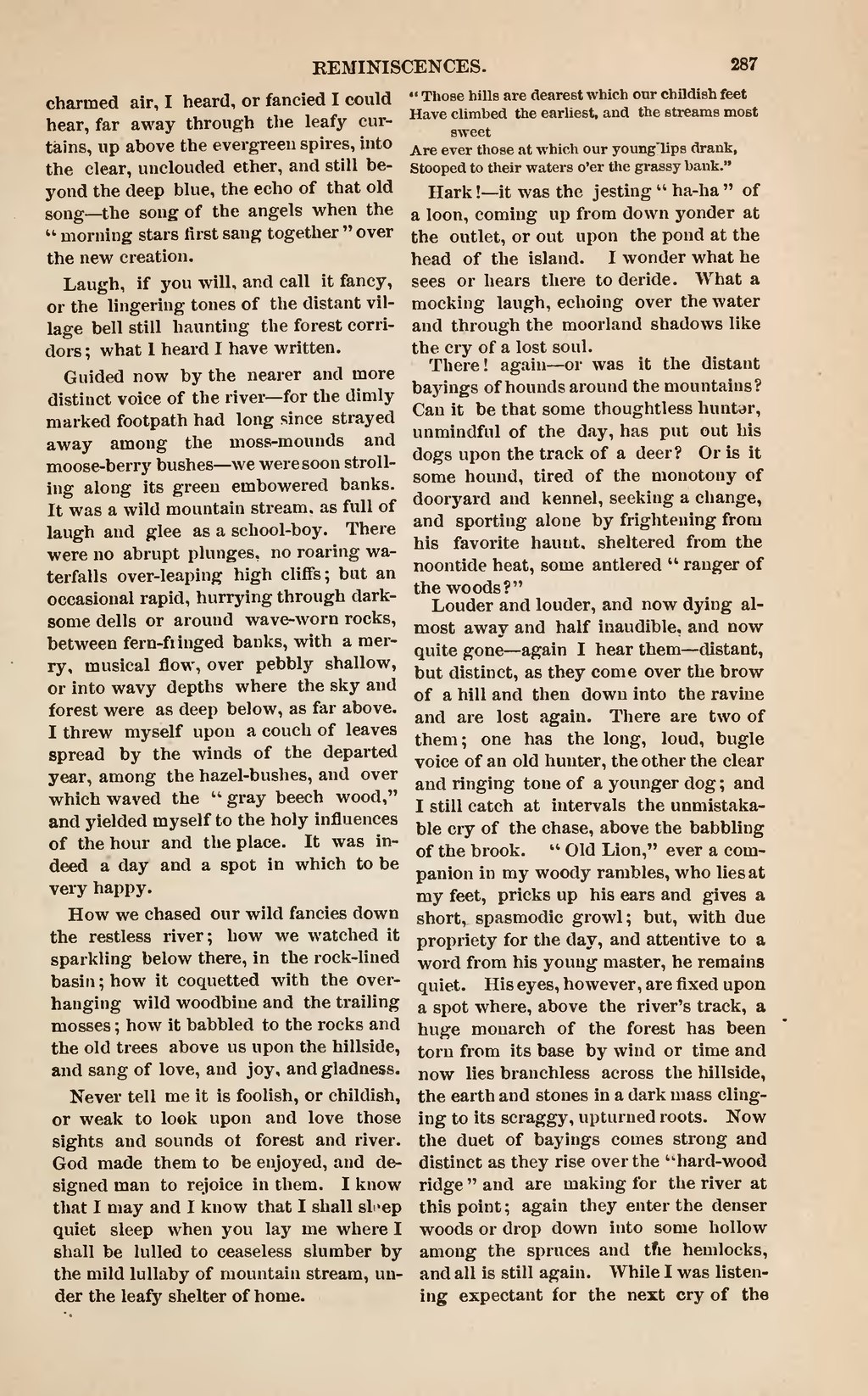REMINISCENCES.
��287
��charmed air, I heard, or fancied I could hear, far away through the leafy cur- tains, up above the evergreen spires, into the clear, unclouded ether, and still be- yond the deep blue, the echo of that old song— the song of the angels when the " morning stars first sang together " over the new creation.
Laugh, if you will, and call it fancy, or the lingering tones of the distant vil- lage bell still haunting the forest corri- dors ; what 1 heard I have written.
Guided now by the nearer and more distinct voice of the river— for the dimly marked footpath had long since strayed away among the moss-mounds and moose-berry bushes — we were soon stroll- ing along its green embowered banks. It was a wild mountain stream, as full of laugh and glee as a school-boy. There were no abrupt plunges, no roaring wa- terfalls over-leaping high cliffs; but an occasional rapid, hurrying through dark- some dells or around wave-worn rocks, between fern-fiinged banks, with a mer- ry, musical flow, over pebbly shallow, or into wavy depths where the sky and forest were as deep below, as far above. I threw myself upon a couch of leaves spread by the winds of the departed year, among the hazel-bushes, and over which waved the " gray beech wood," and yielded myself to the holy influences of the hour and the place. It was in- deed a day and a spot in which to be very happy.
How we chased our wild fancies down the restless river; how we watched it sparkling below there, in the rock-lined basin ; how it coquetted with the over- hanging wild woodbine and the trailing mosses ; how it babbled to the rocks and the old trees above us upon the hillside, and sang of love, and joy, and gladness. Never tell me it is foolish, or childish, or weak to look upon and love those sights and sounds of forest and river. God made them to be enjoyed, and de- signed man to rejoice in them. I know that I may and I know that I shall sl>ep quiet sleep when you lay me where I shall be lulled to ceaseless slumber by the mild lullaby of mountain stream, un- der the leafy shelter of home.
��" Those hills are dearest which our childish feet Have climbed the earliest, and the streams most
sweet Are ever those at which our young'lips drank, Stooped to their waters o'er the grassy bank."
Hark !— it was the jesting " ha-ha " of a loon, coming up from down yonder at the outlet, or out upon the pond at the head of the island. I wonder what he sees or hears there to deride. "What a mocking laugh, echoing over the water and through the moorland shadows like
the cry of a lost soul.
There! again — or was it the distant hayings of hounds around the mountains? Can it be that some thoughtless hunter, unmindful of the day, has put out his dogs upon the track of a deer? Or is it some hound, tired of the monotony of dooryard and kennel, seeking a change, and sporting alone by frightening from his favorite hauut. sheltered from the noontide heat, some antlered " ranger of
the woods?"
Louder and louder, and now dying al- most away and half inaudible, and now quite gone — again I hear them — distant, but distinct, as they come over the brow of a hill and then down into the ravine and are lost again. There are two of them ; one has the long, loud, bugle voice of an old hunter, the other the clear and ringing tone of a younger dog ; and I still catch at intervals the unmistaka- ble cry of the chase, above the babbling of the brook. " Old Lion," ever a com- panion in my woody rambles, who lies at my feet, pricks up his ears and gives a shorty spasmodic growl ; but, with due propriety for the day, and attentive to a word from his young master, he remains quiet. His eyes, however, are fixed upon a spot where, above the river's track, a huge monarch of the forest has been torn from its base by wind or time and now lies branchless across the hillside, the earth and stones in a dark mass cling- ing to its scraggy, upturned roots. Now the duet of hayings comes strong and distinct as they rise over the "hard-wood ridge " and are making for the river at this point; again they enter the denser woods or drop down into some hollow among the spruces and the hemlocks, and all is still again. While I was listen- ing expectant for the next cry of the
�� �
